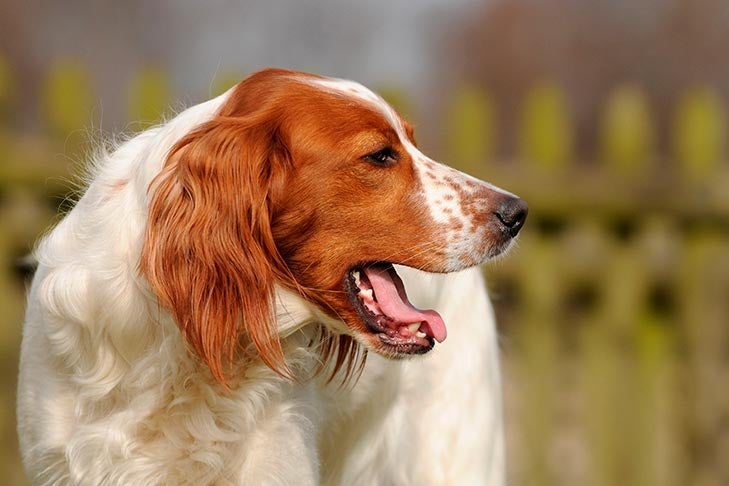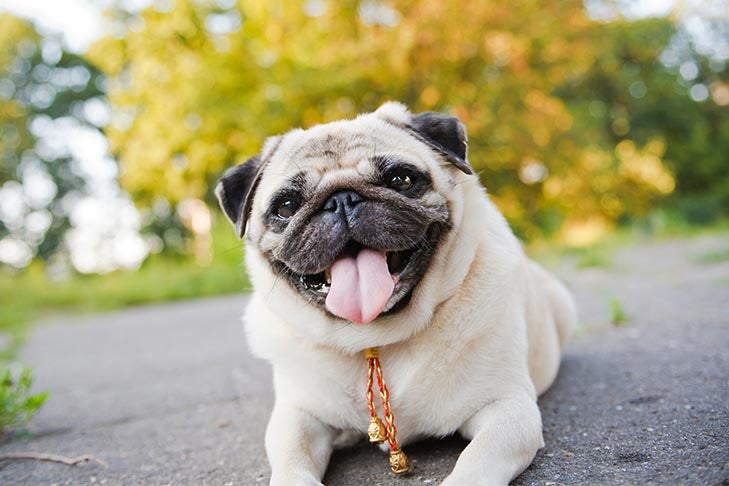Clubs Offering:
The sound of a dog coughing sends alarm bells ringing in most dog owners’ heads. Is your dog sick? Is he choking? Should you call your veterinarian? A dog cough can have many causes, some of which are potentially dangerous. Here is what you need to know about the causes of coughing in dogs and what you can do about it.
Dogs explore the world with their nose—and occasionally their mouth. Your dog comes into contact with all kinds of things, including dust, germs, and the occasional grass stem. All of these things can cause coughing, which makes it hard to determine if your dog’s cough is serious or simply the sound of your dog clearing her throat.
An occasional cough may be normal dog behavior and is not a cause for concern. Repetitive coughing, on the other hand, could be a sign of a more serious problem, especially if there are changes in breathing sounds or patterns.
One of the ways to narrow down the possible causes for your dog’s cough is to identify the type of cough. This is important information for you to gather, as it can help your veterinarian make a more informed decision about your pet’s care. Ask yourself the following questions:
Each of these types of cough indicates a particular problem. Make sure you describe the sound of your dog’s cough when you call your veterinarian, since this can help determine whether or not it is an emergency or if it could be a contagious disease like kennel cough or canine influenza virus.

A deep, dry, honking canine cough could be a symptom of kennel cough or tracheobronchitis (upper airway, meaning not the lungs). Kennel cough is a highly contagious disease caused by bacterium OR a number of viruses. It normally causes only mild illness and discomfort, but it can descend into the lungs causing serious problems like pneumonia or chronic bronchitis.
Dogs can pick up kennel cough in boarding and doggy daycare facilities, and any other places where dogs congregate. It is normally not a serious disease, but your veterinarian may prescribe some medication to help treat the cough and will recommend that you keep your dog away from other dogs until the infectious stage is over.
A high-pitched, gagging cough can be suggestive of upper airway irritation, infection or even a partial blockage. Either your dog has a sore throat, which could be secondary to tonsillitis (fairly uncommon in dogs), secondary to infections of the mouth, or sinus, or possibly a foreign body or material stuck in his throat causing discomfort and a sore throat. Foreign objects lodged in the throat are dangerous, and prevent proper ventilation and swallowing. A foreign object that makes its way into your dog’s esophagus can be potentially life threatening and requires immediate veterinary attention.
A wet, phlegmy “moist” cough could be a symptom of lower airway or lung (pulmonary) problem. Those wet, gargling sounds indicate that there may be fluid in your dog’s lungs. Unlike with other coughs, the breathing will be labored even when the dog is not coughing. This warrants immediate veterinary attention, which means you need to get on the phone with your veterinarian and get your dog an appointment ASAP.
Pneumonia usually affects dogs with undeveloped or weakened immune systems including young puppies and senior dogs. There are many causes of pneumonia in dogs, including bacteria, viruses, parasites, fungi, or aspiration secondary to inhalation of foreign material after vomiting or after exposure to toxins, such as petroleum distillates/gasoline, etc.
Toy breeds are at an increased risk of tracheal collapse. One of the symptoms of tracheal collapse is a honking cough that sounds like a goose. This sound may become more pronounced when your dog is pulling against his collar, and obese dogs are at an increased risk of developing tracheal collapse. It can also show up in hot, humid weather during exercise.

There are many types of heart disease in dogs. When the heart is not functioning properly as a pump, fluid may start to accumulate in the lungs. This is called Congestive Heart Failure.
Dog breeds that are prone to heart disease, such as Cavalier King Charles Spaniels, may start coughing as the disease progresses. This type of coughing mainly happens when your dog is sleeping or lying down and means that fluid is building up around your dog’s lungs. This is a serious symptom, so be sure to talk to your veterinarian about treatment options for congestive heart failure.
Less Common Causes of Dog Cough
The above causes of coughing in dogs are all serious, but there are some additional, less common causes of coughing that your vet may want to rule out.
Coughing in dogs is usually treatable. Before your veterinarian can treat your dog’s cough, however, he or she has to diagnose the underlying cause of the cough. Veterinarians diagnose based on a combination of tests and clinical signs. Your veterinarian will perform a physical exam, listening to your dog’s heart and lungs, taking your dog’s temperature, and performing diagnostic tests, as necessary, to determine what is bothering your dog.
Once he finds the underlying cause, your vet will discuss a treatment plan catered to your dog’s unique needs that treats both your dog’s coughing and the underlying cause or disease.
Environmental allergens
Pollen, smoke, fungi, and other inhaled allergens can cause coughing in your dog. If your dog has allergies, consider keeping them indoors during peak allergy season, or ask your veterinarian for medication to alleviate the symptoms.
Signs of Kennel Cough in Dogs – Symptoms Diagnosis Treatment Expectations
Its normal for your dog to cough every now and then. Its part of everyday life for an animal that can sniff 4 to 6 times per second. But if your dog does it a lot or canât seem to stop, you may have a sick pup, and they may need treatment.
Like us, dogs cough to get rid of dust, germs, and other stuff they breathe in.
Dogs are social creatures that naturally sniff and slurp. This is why bacteria and viruses â including a canine form of the flu — quickly spread from dog to dog. Germs also can land on floors, furniture, food bowls, toys, and other surfaces where the next dog to come along picks them up.
Your vet will examine your dog and run tests to find out if the problem is due to a virus, an infection, an allergy, or a different problem. The treatment will depend on the cause.
Just like any other sick member of the family, your dog deserves a little TLC until their cough clears. Make sure they have plenty of water, healthy dog food, and rest. Steer clear if they want to be alone. Tell kids to let sleeping dogs lie, and keep them away from other dogs until they are well.
The best way to keep your dog healthy is to prevent problems before they start. Make sure your dog gets their shots every year and gets heartworm prevention as directed. Dont let them play with other dogs who are coughing or sick.